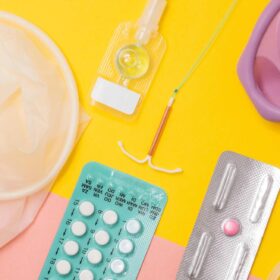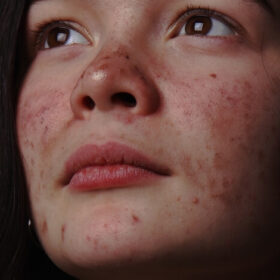
Acne returning when coming off the pill
In this article
What's the lowdown?
40% of reviewers at The Lowdown experienced spots or acne when stopping their contraception.
The combined pill can improve acne, and is often prescribed as a treatment.
Stopping the pill does not cause acne.
Stopping the comined pill means the beneficial effects of oestrogen are taken away, and acne may return.
Hormonal contraception can come with many benefits which can include:
- pregnancy prevention
- lighter periods
- reduced PMS
- and clearer skin
For many acne sufferers, the combined pill is prescribed as a first treatment option, with many praising the positive effects it has on their skin.
At some point though, people may want to stop taking the pill. Where acne is concerned, this presents a problem: what happens when you stop taking the pill?
We asked our users, and 40% of them told us that they experienced spots or acne when stopping contraception, and for hormonal methods, this figure was even higher. 47% of combined contraception users, 48% of injection users and 44% of mini pill users reported that they noticed their spots or acne worsening when they stopped taking their contraception.
Why is this? Does coming off the pill cause acne? Is this temporary? And how do we manage it? Here’s the lowdown…
What happens when you stop taking the pill?
To answer this question, it’s probably easier to flip it on its head and look at what happens to our bodies and our hormones when we take the pill. Hormonal contraception has effects on our body including on your skin, and when you stop taking the pill these effects stop.
The combined pill suppresses our bodies’ natural hormones due to the synthetic oestrogen and progestogen. The oestrogen found in the combined pill helps acne as it reduces sebum (oil) production in the skin which can contribute to acne. If you suffered from acne before taking the pill, and it cleared up while you were on it, it may return when you stop contraception.
That being said, our skin and hormones change as we age, and some women may find that their acne doesn’t return once they stop taking the pill. For other women, acne may begin once they come off hormonal contraception, even though they have never had it before.
This is because some acne occurs during puberty, and improves in adulthood, while some acne, known as adult acne, occurs later in life. When you’re on the pill, these natural hormonal changes can be masked, so you might not know whether acne has cleared up, reamined or begun until you stop taking it.
Can the pill cause acne?
You might have been offered the pill to clear up your acne, or you may have found that the pill itself caused you to break out. We’ve got a full guide on the best contraceptive for acne, but here’s a brief breakdown:
Acne is caused by excess sebum (oil) being produced in our skin’s glands. Androgens are male type hormones like tesosterone. They are produced in our ovaries and increase the production of sebum leading to blocked pores and spots. Oestrogen can reduce the production of androgens and increases the amount of a protein in our blood called sex hormone binding globulin which mops up testosterone. This is why women can be offered a combined contraception method as a treatment option for acne. This also explains why some of us break out just before our periods, when our oestrogen levels drop.
For now, it isn’t really clear what effect progestogen, the hormone in the progestogen-only pill (aka the mini pill), has on acne. It is thought that it can make sebum production worse, though, which is why some women might experience more spots than normal while taking the progestogen-only pill.
There are several types of progestogens, and some are classed as ‘anti-androgenic’, meaning they block androgen activity. There is evidence that hormonal contraception containing anti-androgenic progestogens (Eloine, Yasmin, Lucette, Slynd, Qlaira, Dianette) could be more beneficial for acne when compared to progestogens that are not anti-androgenic (Microgynon, Rigevidon, Ovranette). The differences between pills, as well as our own individual biology, explains why so many women find that their contraception affects their skin differently to their friends, for example.
It’s a minefield, we know, but it does go some way towards explaining why acne may return – or begin – when we stop taking hormonal contraception. Whatever effect your particular pill was having on your sebum production is removed, and our skin goes back to ‘normal’ – whatever that may be.
This is the case not only if you stop contraception altogether, but also if you switch to a non-hormonal method, like the copper coil, for example.
Will coming off the pill cause acne?
No, coming off the pill won’t cause acne. But coming off the pill will unmask any acne problems that the pill was treating. If your skin worsens on progestogen-only contraception, coming off it or switching to a combined method or non-hormonal method may improve it.
Managing post-pill acne
As post-pill acne isn’t actually caused by the pill at all, it’s unlikely to go away on its own. Like we said earlier, what you’re experiencing is unrelated to your contraception, and is a result of your own natural hormones. The good news, though, is that there are increasingly more treatment options for acne, regardless of its severity.
Mild acne
If you have mild acne (whiteheads or blackheads, and the occasional spot) you should be able to treat the problem with a good skincare routine and/or some over-the-counter treatments.
Certain acids, such as glycolic acid, salicylic acid and mandelic acid, are found in many skincare formulations, and have been clinically proven to improve both active acne and scarring. The quantities of each acid in different skincare products differ, though, so be sure to do your research and check out reviews before you invest.
Your pharmacist may also offer you a gel or cleanser containing benzoyl peroxide. Benzoyl peroxide is an antiseptic, and it kills the germs on your skin that cause acne. Some formulations of benzoyl peroxide are only available on prescription, but you can buy Acnecide, a brand of benzoyl peroxide, over the counter. You can also find benzoyl peroxide in some skincare products, but the strength of the active ingredient can be low, so speak to your pharmacist if you’re unsure.
Moderate or severe acne
Moderate acne is characterised by a larger quantity of whiteheads and blackheads, as well as many spots. Severe acne is diagnosed if you have lots of large, painful cysts and spots, with or without scarring.
The NHS recommends that people with moderate or severe acne speak to their GP about treatment. Your doctor might prescribe you something topical (applied directly to the skin), like a retinoid or antibiotic, or may suggest you try an oral medication, such as an antibiotic or – you guessed it – hormonal contraception. Tell your doctor if you have stopped hormonal contraception for a specific reason or side effect; it may be that they are able to prescribe a method more suited to you that might help with your acne.
You may be referred on to a dermatologist if your acne is particularly severe. This usually happens when your acne is also present on your chest or back, if your acne is significantly painful or distressing, or if you have, or are at risk of scarring.
You can also use the treatments advised for mild acne above, but speak to your doctor before mixing these with anything that has been prescribed to you. Do remember that it can take months to start seeing a difference in your skin after beginning an acne treatment.
Where can I get support for acne?
Always remember that you are so much more than your skin. Everybody is different, and the path you choose to take has to be right for you, whether that’s hormonal contraception or a non-hormonal treatment. We can, however, help you find the best contraceptive pill for acne if you are looking to continue with hormonal contraception to manage your skin.
If you are finding yourself struggling with your confidence or mood because of your acne, please reach out to your GP or visit Acne Support, who have information about emotional support resources available to you.
Our medical review process
This article has been medically reviewed for factual and up to date information by a Lowdown doctor.


